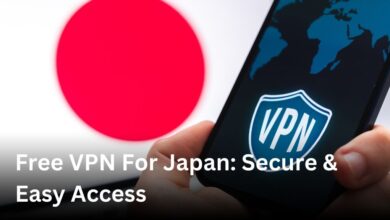
Anti Censorship VPN: How to Regain Your Access to the Free Internet
Have you tried accessing your favorite website recently only to find it blocked? Unfortunately, Internet censorship is becoming more widespread around the world. Governments and organizations are restricting access to information and services on the web for various reasons. If you’ve had enough of Internet censorship and want to regain access to an open web, a VPN or virtual private network is the solution you’ve been looking for. Using a VPN allows you to bypass censorship restrictions and access blocked content. In this article, we’ll show you how to choose and set up a VPN to evade censorship and enjoy an open Internet experience once again. The days of censorship are numbered, at least for you. Read on to learn how to outsmart censorship with an anti censorship VPN.
Why You Need an Anti-Censorship VPN
Living in a country with internet censorship sucks. How are you supposed to keep up with the latest memes and binge your favorite shows when the government is blocking access to half the internet? A anti-censorship VPN is the answer.
A VPN, or virtual private network, masks your internet activity and location. It routes your internet connection through an encrypted tunnel, hiding what sites you visit and bypassing any blocks. Once connected, you’ll have unrestricted access to whatever parts of the web you want. Talk about freedom!
You have a few options for VPNs that specialize in defeating censorship. Many are free to use and available on all your devices – phones, tablets, computers, you name it. All you have to do is download the app, create an account, and connect.
To get started, choose a VPN with servers located outside your country. The farther the better, as they’ll be less likely to cooperate with local authorities. Then select a protocol like OpenVPN or WireGuard that uses strong encryption to hide your browsing. Finally, connect and you’ll be good to go, with an internet experience like you used to enjoy!
Using an anti-censorship VPN is a simple way to take back control of your digital life. No more living in the dark, you can stay up to date on current events, connect with friends abroad, and access all your favorite websites again. True online freedom is just a few taps away. Why wait?
How Anti-Censorship VPNs Work to Evade Government Firewalls
A VPN, or virtual private network, masks your online activity and location. Anti-censorship VPNs take things a step further by hiding your internet traffic from prying eyes so you can access sites and services that are blocked. Here’s how they do it:
- They encrypt your internet connection. VPNs scramble your browsing data into unreadable code that hides what sites you visit and what you do on them. This encrypted tunnel prevents your internet service provider (ISP) or government from seeing your activity.
- They mask your real IP address. VPNs assign you a temporary IP address that makes it appear as if you’re accessing the internet from another location. This tricks geoblocks and censorship filters into thinking you’re in a different country or region.
- They reroute your internet traffic. Anti-censorship VPNs channel your browsing data through secure servers in locations with more internet freedom. This rerouting technique fools censors into thinking you’re accessing an uncensored network.
- They have obfuscation technology. Some anti-censorship VPNs use special tools like obfuscation servers and layering techniques to hide the fact that you’re even using a VPN. This advanced obfuscation helps ensure your VPN use stays undetectable.
Using an anti-censorship VPN is one of the best ways to bypass internet censorship and access the open web. With the right VPN service, you’ll be able to enjoy a freer and more open internet experience no matter where you are. Now isn’t that worth fighting for?
Choosing the Best Anti-Censorship VPN for You
Look for a no-logs policy
The first thing you want to check is if the VPN keeps logs of your online activity and connection data. Some VPNs log information like your IP address, websites visited, and bandwidth used, which completely defeats the purpose of privacy protection. Look for a strict no-logs policy to ensure your data isn’t being recorded.
Consider the number of servers
More servers mean you’ll have an easier time finding a stable connection and accessing geo-restricted content from different locations. Look for a VPN with servers in the countries or regions you frequently access the internet from or want to appear to be accessing the internet from. The more servers the better, as long as they are located in the right places for your needs.
Check available protocols
For the best censorship circumvention, look for a VPN that offers OpenVPN, L2TP/IPsec, SSTP or WireGuard protocols. These are the most secure and help mask the fact that you’re using a VPN to bypass censorship. OpenVPN is generally considered the most secure, but may be blocked in some highly censored countries. Multiple protocol options give you the best chance of finding one that works.
Consider extra features
Some VPNs offer additional features like a kill switch to disable your internet if the VPN drops, built-in ad blocking, malware protection or split tunneling. While not essential, extra security and privacy features provide added value. However, more features often mean a higher price, so only pay for what you need.
Compare pricing and plans
Most VPNs offer monthly, yearly and multi-year subscription plans. Yearly or multi-year plans typically offer the best value. Look for a plan with all the features you need at a fair price. Some VPNs also regularly offer discounts, coupons and special promotional offers for the first year of service. Shop around at a few providers to find the best deal on a high-quality anti-censorship VPN that meets your needs.
Setting Up Your Anti-Censorship VPN
To bypass internet censorship and access websites that are blocked in your location, you’ll need to set up an anti-censorship VPN. A VPN or virtual private network creates an encrypted tunnel between your device and a VPN server in another location, hiding your online activity and bypassing regional restrictions.
Choose a VPN Provider
Select a reputable VPN provider that specifically offers anti-censorship features. Some highly-rated options are ExpressVPN, NordVPN, and TunnelBear. Compare them based on factors like security, privacy, speed, and cost to find one that suits your needs. Many offer free trials so you can test them out.
Download the VPN App
Once you subscribe to a VPN service, download their app onto your device(s). Most offer software for Windows, Mac, Android and iOS so you can enable the VPN on your computer, phone and tablet. The app will walk you through setting up your account login details to get connected.
Connect to a VPN Server
Open the VPN app and choose a server location where the websites you want to access aren’t blocked, like the U.S. or Europe. Click to connect and the VPN will mask your IP address, encrypt your traffic and reroute it through the server location you selected. This disguises your online activity and tricks websites into thinking you’re accessing them from the VPN server area.
Related Article : Free VPN vs Paid VPN, Which One Select!
Enable the VPN Kill Switch (optional)
For added security, you can enable the VPN kill switch feature (if offered by your provider). This will cut off your internet connection if the VPN drops to prevent your online activity from becoming exposed. While the kill switch is optional, it provides an extra layer of protection for your privacy.
Using an anti-censorship VPN is one of the best ways to bypass internet censorship and access restricted content from anywhere. Once you find a reputable service, download their app and connect to one of their servers in an uncensored location, you’ll have unrestricted access to websites and be able to share information freely again.
Staying Safe While Using an Anti-Censorship VPN

Once you have your anti-censorship VPN set up and ready to use, it’s important to keep yourself secure. After all, the point of using a VPN is to protect your privacy and access information freely—you don’t want to compromise that! Here are some tips to stay safe while using your VPN:
Choose a Strong Password
Select a password with a minimum of 8 characters, including uppercase letters, lowercase letters, numbers, and symbols. A strong password will help prevent unauthorized access to your VPN account.
Enable Two-Factor Authentication
If available with your VPN provider, turn on two-factor authentication (2FA). This adds an extra layer of security for logging in to your account. Typically, it will send a code to your phone that you enter along with your password.
Don’t Save Passwords in Your Browser
Your browser may offer to save your VPN login info for convenience, but it’s best not to use this feature. Saving passwords in your browser could allow someone else to access your VPN if they gain access to your device.
Use Incognito Mode
When connected to your VPN, browse the web in Incognito or Private mode. This will prevent your browser from saving your browsing history, cookies, and site data. Once you close the incognito window, the data is deleted.
Manually Disconnect When Done
Don’t forget to manually disconnect from the VPN when you are finished using it. If you leave the VPN connected all the time, it can slow down your internet speed for regular browsing and streaming. It also keeps your online activities hidden even when you don’t need it to. Make disconnecting from the VPN part of your routine to avoid this.
By following these best practices, you can enjoy the benefits of your anti-censorship VPN while avoiding potential security risks. Browse freely and stay safe! Let me know if you have any other questions on using your VPN securely.
In conclusion, an anti-censorship VPN is a valuable tool for individuals seeking to regain their access to the free internet. With the rise of online censorship and content restrictions imposed by governments, ISPs, or other entities, it has become increasingly important to protect online freedom and maintain privacy.
By using an anti-censorship VPN, users can bypass geo-restrictions and access blocked websites or services. The VPN encrypts internet traffic and routes it through secure servers located in different countries, effectively masking the user’s IP address and location. This allows users to evade censorship measures and enjoy an unrestricted online experience.
In addition to bypassing censorship, an anti-censorship VPN provides an extra layer of security. By encrypting data transmissions, it protects sensitive information from potential eavesdropping and hacking attempts. This is particularly important when accessing the internet through unsecured networks, such as public Wi-Fi hotspots.





